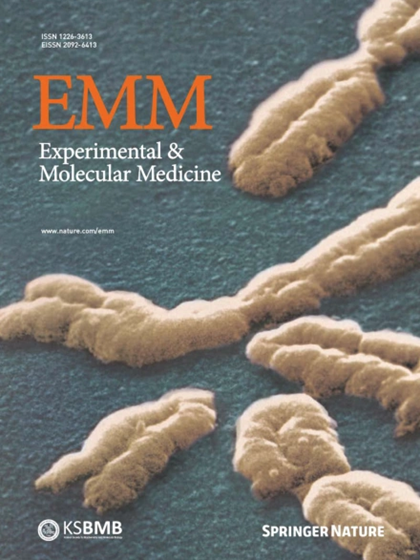大麻二酚重塑肠道微生物群,促进小鼠的耐力运动。
IF 9.5
2区 医学
Q1 BIOCHEMISTRY & MOLECULAR BIOLOGY
引用次数: 0
摘要
大麻二酚(CBD)是一种来自大麻的非精神活性化合物,对人类和动物具有多种生物活性功能。有证据表明,CBD促进运动员肌肉损伤的恢复,但CBD是否以及如何提高耐力表现仍不清楚。在这里,我们研究了CBD治疗对小鼠运动表现的影响,并评估了这种影响是否涉及肠道微生物群。CBD显著提高了小鼠在跑步机上的跑步表现,并伴有氧化肌纤维成分的增加。CBD还增加了线粒体生物发生和相关基因如PGC-1α、磷酸化CREB和AMPK在肌肉组织中的表达。有趣的是,CBD改变了肠道微生物组的组成,抗生素治疗降低了CBD和线粒体生物发生对肌肉耐力的增强作用。我们分离出一种由CBD增加的微生物动物双歧杆菌,并将其命名为KBP-1。用动物双球菌KBP-1治疗小鼠可改善其跑步性能。全基因组分析显示,B. animalis KBP-1高表达与支链氨基酸生物合成、支链氨基酸释放泵表达和乳酸代谢相关的基因。总之,我们的研究确定了CBD和B. animal alis KBP-1是潜在的耐力运动促进剂。本文章由计算机程序翻译,如有差异,请以英文原文为准。

Cannabidiol reshapes the gut microbiome to promote endurance exercise in mice
Cannabidiol (CBD), a nonpsychoactive compound from Cannabis, has various bioactive functions in humans and animals. Evidence suggests that CBD promotes muscle injury recovery in athletes, but whether and how CBD improves endurance performance remains unclear. Here we investigated the effects of CBD treatment on exercise performance in mice and assessed whether this effect involves the gut microbiome. CBD administration significantly increased treadmill running performance in mice, accompanied by an increase in oxidative myofiber composition. CBD also increased mitochondrial biogenesis and the expression of associated genes such as PGC-1α, phosphorylated CREB and AMPK in muscle tissue. Interestingly, CBD altered the composition of the gut microbiome, and antibiotic treatment reduced the muscle endurance-enhancing effects of CBD and mitochondrial biogenesis. We isolated Bifidobacterium animalis, a microbe increased by CBD administration, and named it KBP-1. Treatment with B. animalis KBP-1 in mice resulted in improved running performance. Whole-genome analysis revealed that B. animalis KBP-1 presented high expression of genes involved in branched-chain amino acid biosynthesis, expression of branched-chain amino acid release pumps and metabolism of lactic acid. In summary, our study identified CBD and B. animalis KBP-1 as potential endurance exercise-promoting agents. This study explores how cannabidiol (CBD), a compound from the Cannabis sativa plant, affects exercise performance and muscle function. The researchers wanted to see if CBD could improve endurance by changing gut bacteria. They found that CBD improved endurance and increased the presence of certain gut bacteria, including Bifidobacterium animalis, that may help muscles use energy more efficiently. The study involved treating mice with either CBD or B. animalis for 4 weeks and measuring their running ability on a treadmill. The researchers examined changes in muscle fibers and gut bacteria composition. They discovered that CBD and B. animalis increased oxidative muscle fibers, which benefit endurance performance. The results suggest that CBD enhances exercise performance by promoting beneficial gut bacteria and improving muscle energy use. The researchers conclude that both CBD and B. animalis could be used to boost endurance.
求助全文
通过发布文献求助,成功后即可免费获取论文全文。
去求助
来源期刊

Experimental and Molecular Medicine
医学-生化与分子生物学
CiteScore
19.50
自引率
0.80%
发文量
166
审稿时长
3 months
期刊介绍:
Experimental & Molecular Medicine (EMM) stands as Korea's pioneering biochemistry journal, established in 1964 and rejuvenated in 1996 as an Open Access, fully peer-reviewed international journal. Dedicated to advancing translational research and showcasing recent breakthroughs in the biomedical realm, EMM invites submissions encompassing genetic, molecular, and cellular studies of human physiology and diseases. Emphasizing the correlation between experimental and translational research and enhanced clinical benefits, the journal actively encourages contributions employing specific molecular tools. Welcoming studies that bridge basic discoveries with clinical relevance, alongside articles demonstrating clear in vivo significance and novelty, Experimental & Molecular Medicine proudly serves as an open-access, online-only repository of cutting-edge medical research.
 求助内容:
求助内容: 应助结果提醒方式:
应助结果提醒方式:


